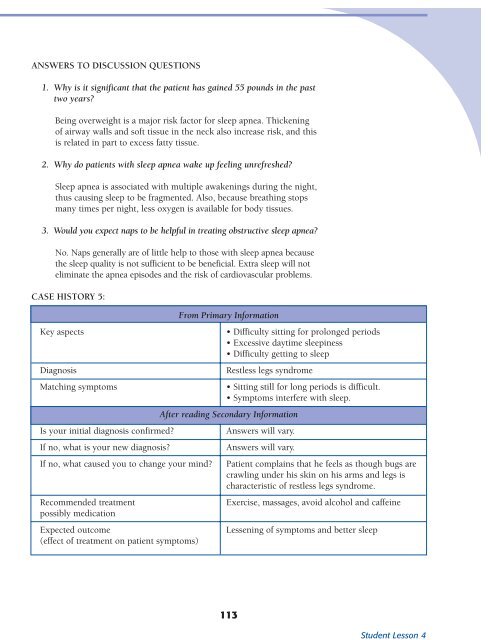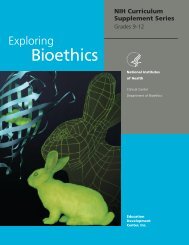Biological - NIH Office of Science Education - National Institutes of ...
Biological - NIH Office of Science Education - National Institutes of ...
Biological - NIH Office of Science Education - National Institutes of ...
Create successful ePaper yourself
Turn your PDF publications into a flip-book with our unique Google optimized e-Paper software.
ANSWERS TO DISCUSSION QUESTIONS<br />
1. Why is it significant that the patient has gained 55 pounds in the past<br />
two years?<br />
Being overweight is a major risk factor for sleep apnea. Thickening<br />
<strong>of</strong> airway walls and s<strong>of</strong>t tissue in the neck also increase risk, and this<br />
is related in part to excess fatty tissue.<br />
2. Why do patients with sleep apnea wake up feeling unrefreshed?<br />
Sleep apnea is associated with multiple awakenings during the night,<br />
thus causing sleep to be fragmented. Also, because breathing stops<br />
many times per night, less oxygen is available for body tissues.<br />
3. Would you expect naps to be helpful in treating obstructive sleep apnea?<br />
No. Naps generally are <strong>of</strong> little help to those with sleep apnea because<br />
the sleep quality is not sufficient to be beneficial. Extra sleep will not<br />
eliminate the apnea episodes and the risk <strong>of</strong> cardiovascular problems.<br />
CASE HISTORY 5:<br />
Key aspects<br />
Diagnosis<br />
Matching symptoms<br />
Is your initial diagnosis confirmed?<br />
If no, what is your new diagnosis?<br />
If no, what caused you to change your mind?<br />
Recommended treatment<br />
possibly medication<br />
Expected outcome<br />
(effect <strong>of</strong> treatment on patient symptoms)<br />
From Primary Information<br />
• Difficulty sitting for prolonged periods<br />
• Excessive daytime sleepiness<br />
• Difficulty getting to sleep<br />
Restless legs syndrome<br />
• Sitting still for long periods is difficult.<br />
• Symptoms interfere with sleep.<br />
After reading Secondary Information<br />
Answers will vary.<br />
Answers will vary.<br />
Patient complains that he feels as though bugs are<br />
crawling under his skin on his arms and legs is<br />
characteristic <strong>of</strong> restless legs syndrome.<br />
Exercise, massages, avoid alcohol and caffeine<br />
Lessening <strong>of</strong> symptoms and better sleep<br />
113<br />
Student Lesson 4

















